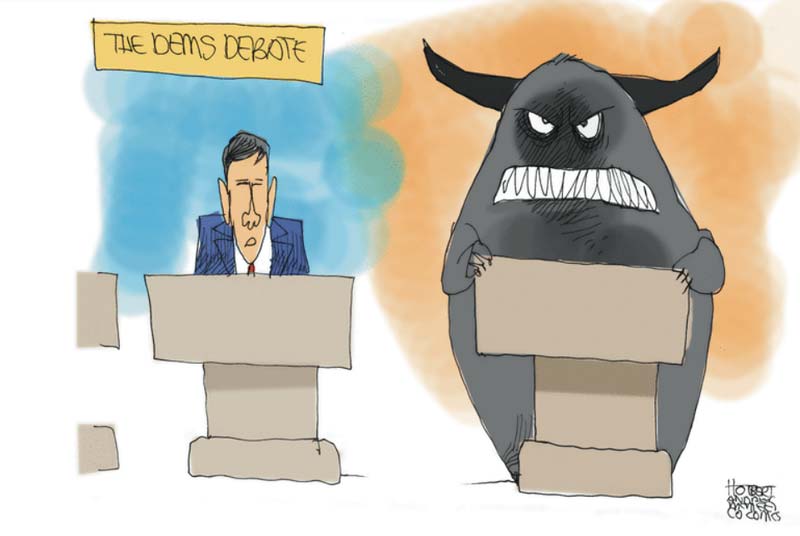
The Post-ABC News poll (29%), the Emerson poll (30% ) and the Morning Consult poll (31%) all show former Vice President Joe Biden dropping a significant amount yet still in first place. In early states, Biden lost 12 points compared with 7 points overall in the Morning Consult survey.
Morning Consult shows Biden has lost 8 points among African Americans, but not all of his support went to Sen. Kamala Harris, D-Calif. After the debate, Sen. Bernie Sanders, I-Vt., also gained slightly (4%) with African American voters in that same poll.
Harris got a significant bounce in all three polls after her debate and wall-to-wall positive coverage - now registering at 13% to 15% of the primary electorate, in a tie (or statistical tie) with Sen. Elizabeth Warren, D-Mass. For the first time, Harris is a smidgen ahead of Sanders in the RealClearPolitics average, with Warren a point back.
Still, the difference between the three is insignificant, so consider them in a three-way tie. Sanders, who was registering in the mid-20s in April, is now in the mid-teens and seems to have plateaued - his core base is sticking with him, but he's not adding new voters.
In the latest polls, South Bend, Indiana, Mayor Pete Buttigieg is at approximately 5%, a few points lower than where Harris stood before her breakout performance last month. Beto O'Rourke and Sen. Cory Booker, D-N.J., are the only others now at or above 2% in the RCP averages.
In face-to-face match-ups against President Donald Trump, Biden does the best of any Democrat and consistently scores outside the margin of error. Sanders recently has come in slightly above Trump (a shade over 4% in the RCP averages), but often within the margin of error. Harris and Warren are about 2 points ahead of Trump in the RCP averages (again within the margin of error).
We have several takeaways from all of this.
First, it's clear that Biden's support was, in fact, fragile, as the first significant event in the contest, the debate, demonstrated. His draw, however, has been in large part premised on his ability to beat Trump; if he continues to do a whole lot better against Trump than the other contenders, that advantage will remain.
Second, while over the past six months Biden has lost a chunk of his support, Sanders has lost even more. At the same time, Warren, once written off by a chunk of the media, and Harris have clearly climbed into the tier of competitive candidates behind Biden.
Third, we don't know how things would pan out for Biden if the second tier of three went down to a single candidate. If Sanders dropped out, a plurality of his voters would go to Biden, according to the Morning Consult poll. Interestingly, there is a chunk of Warren and Harris voters who seem to prefer the other woman over the other male candidates - if either dropped out, a plurality would go to the other woman.
Fourth, the first debate did shake up the race, but the next one and the one after that could as well. A strong performance from Biden would arguably stop the erosion in his support; a bad one from Harris would provoke "Just a flash in the pan?" headlines. What seems to be the case, however, is that for the candidates below Buttigieg in the polls, even a good performance doesn't allow for a breakout. It seems that voters are already comparing the top candidates with one another and not to a stray candidate at 1% or 2%.
Fifth, the past few weeks should underscore how unstable the race is and how early we are in the primary. We will see five more debates before the end of the year alone. We are still learning a whole lot about the candidates' backgrounds and records, and none has started a concerted attack on any other participant.
Finally, we've seen a dramatic demonstration of how critical the black vote is in the Democratic primary. As we saw in 2008, a front-runner with strong African American support can tumble if those voters find a viable African American contender, as they did with Barack Obama after his Iowa victory.
The support of African American voters - as Obama had in 2008 and Hillary Clinton had in 2016 - can be absolutely critical, if not determine the outcome. And that, in turn, points to a failure in media coverage: Rather than trace the whims of mostly white, super-progressive voters, the media should be paying a whole lot more attention to African American voters.
It's they who will likely pick the nominee, and in turn, determine whether Democrats can field a winning candidate to boot out Trump.
Sign up for the daily JWR update. It's free. Just click here.
(COMMENT, BELOW)


 Contact The Editor
Contact The Editor
 Articles By This Author
Articles By This Author